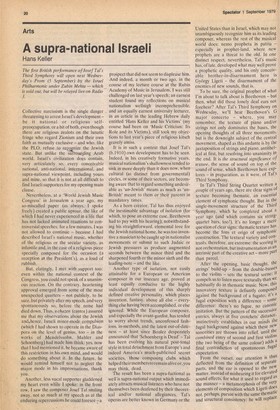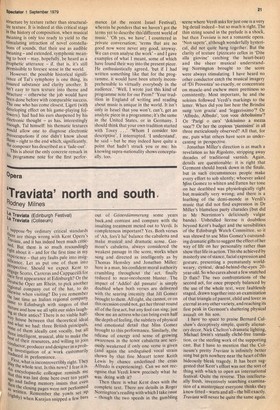Arts
A supra-national Israeli
Hans Keller
The first British performance of Josef Tal's Third Symphony will open next Wednesday's Prom (5 September) by the Israel Philharmonic under Zubin Mehta — which is sold out, but will be relayed live on Radio 3.
Collective narcissism is the single danger threatening to arrest Israel's development be it national or religious selfpreoccupation. or a bit of both, even though there are religious zealots on the lunatic fringe who regard Zionism and their own faith as mutually exclusive and who, like the PLO. refuse „to reauinize the Jewish , state. But unlike the S-urrottris.ding Arab world. Israel's civilization does contain. very articulately so, every conceivable national, anti-national, international, and supra.-national viewpoint, including yours and mine, so that it is not at all difficult to find Israeli supporters for my opening main clause.
Nevertheless, at a 'World Jewish Music Congress' in Jerusalem a year ago. my so-miscalled paper (as always,. I spoke freely) created a public uproar, the like of which I had never experienced in a life that has not lacked animated reactions to controversial speeches: for a few minutes. I was not allowed to continue because I had described Israel's national music, whether of the religious or the secular variety, as infantile and. in the case of a religious piece specially composed for the occasion (a reception at the President's). as a load of rubbish..
But. elatingly, I met with support too: even within the national context of the Congress. you could not speak of a unanimous reaction. On the contrary. heartening approval emerged from some of the most unexpected quarters not publicly, to be sure. but privately after my speech. and very spontaneously so, before the noise had died down. Thus, a chazen (cantor) assured me that my observations about the Jewish and, hence, Israeli minor-mode compulsion (which I had shown to operate in the Diaspora on the level of genius, too in the works of Mendelssohn, Mahler and Schoenberg) had made him think: yes. now that I had mentioned it. he became aware of this restriction in his own mind, and would do something about it. In the future, he would remind himself not to. neglect the Major mode in his improvisations, thank you.
Another. less vocal supporter gladdened my heart even while I spoke: in the front row. I saw the composer Josef Tal smiling away. not so much at my speech as at the enduring repercussions he could foresee 7 a progpect that did not seem to displea'se him. And indeed, a month or two ago. in the course of my lecture course at the Rubin Academy of Music in Jerusalem. I was still challenged on last year's speech; an earnest student found my reflections on musical nationalism wellnigh incomprehensible, and an equally earnest university lecturer, in an article in the leading Hebrew daily entitled 'Hans Keller and his Victims' (my course had been on 'Music Criticism: Its Role and its Victims), still took my objections to last year's .piece of religious kitsch gravely amiss.
It is in such a context that Josef Tal's (b.1910) own development has to be seen. Indeed, in his creatively formative 'years. musical nationalism's shallowness tended to sink in more deeply than it does now, when cultural (as distinct from governmental) circles, or some of their sectors, are becoming aware that to regard something undesirable as 'un-Jewish' means as much as 'un.British' meant to them or their parents in mandatory times.
As a born creator. Tal has thus enjoyed the inestimable advantage of isolation (for which, to pose an extreme case. Beethoven had to pay with his hearing); notwithstanding his straightforward. elemental love for the Jewish national home, he was too inventive a musician to be caught up in nationalist movements or submit to such Judaic or Jewish pressures as produce augmented seconds between the minor third and the sharpened fourth or the minor sixth and the leading-note and the like.
Another type of isolation, not easily attainable for a European or American composer in our insecure age, proved at least equally conducive to the highly individual development of this sharply defined creative personality, which places invention, fantasy, above all else everything else having been accomplished, or else ignored. While the European composer. and especially the avant-gardist. has tended to worry about trends. unconfessed fashions, in-methods, and the latest out-of-dateness at least since Boulez desperately announced that 'Schoenberg is Dead' Tal has been evolving his natural post-tonal style in total detachment from Europe's and indeed America's much-publicised secret societies, those composing clubs which helped their mem bers to remain alive or, you may think, dead. The result has been a supra-factional as we ll'is supra-national output which immediately attracts musical listeners who have not themselves been deafened by their theoretical and/or national allegiances. Tal's operas are better known in Germany or the United States than in Israel, which may not unambiguously recognize him as its leading composer, whereas the rest of the musical world does: nemo propheta in patria especially in prophet-land, where new prophets are a threat to the old. In one distinct respect, nevertheless, Tal's music has, of late, developed what may well prove a prophetic quality, and his only conceivable brother-in-disarmament here is GyOrgy Ligeti the disarmament of the enemies of new sounds, that is.
To be sure, the original prophet of what I'm about to talk about is Beethoven but then, what did those lonely deaf ears not forebear? After Tal's Third Symphony on Wednesday, we'll hear Beethoven's G major concerto where. you may remember. the texture of piano and/or strings not only dominates the bases. the opening thoughts of all three movements. but is the downright subject of the central movement, shaped as this andante is by the juxtaposition of strings and piano, antithetical at first, but resolving into unanimity In the end. It is the structural significance of texture, the sense of sound on top of the sound of sense, which Beethoven here explores in preparation. as it were, of Tal's Third Symphony.
In Tal's Third String Quartet written a couple of years ago, there are clear signs of texture becoming thematic, an essential element of symphonic thought. But in the single-inovement structure of the Third Symphony. which he completed about a year ago (and which contains six string quartet bars, too!). it's no longer a mere question of clear signs: thematic texture has become the fons et origo of symphonic construction. The textural variety and contrasts, therefore, are extreme: the scoring is not orchestration, but instrumentation as an intrinsic part of the creative act more part than parcel. After the opening, basic thought, the strings' build-up from the double-basses to the violins sets the textural scene: it compels us to listen more texturally than vv,c habitually do in thematic music. Now, this innovatory texture is defiantly composed against the background of a fugato; it's a fugal exposition with a difference some difference: there's no fugue, no canonic imitation. But the pattern of the successive entries, always at five crotchets' distance. instinctively establishes in our minds the fugal background against which these new sonorities are thrown into relief. until the combined entry of second and first violins (the two being of the same colour) adds a final contradiction of spontaneous fugal expectation. From the outset, our attention is thus deflected from the definition of separate parts, and the ear is opened to the new matter, instead of mishearing it for elevated sound effects, for what it used to regard as the manner a metamorphosis of the very elements of composition which Ligen due,s not. perhaps pursue with the same thematic and structural consistency; he will replace structure by texture rather than structuralize texture. It is indeed at this critical stage in the history of composition, when musical meaning is only too ready to yield to the stimulating attraction of novel constellanons of sounds, that their use as audible meaning — and extended, symphonic meaning to boot — may, hopefully, be heard as a Prophetic utterance — if. that is, it's still Permissible to foresee sense in the world.
However, the possible historical significance of Tars symphony is one thing, its assured substance and clarity another. It Isn't easy to turn texture into theme and structure — otherwise the job would have been done before with comparable success. The one who has come closest, Ligcti (with developing effect on his game-playing followers), had had his ears sharpened by his electronic thought — as has, interestingly enough. Tal himself: his thematic textures would allow one to diagnose electronic Preoccupations if one didn't know about them — right to the end which, significantly, the composer has described as a 'fade-out'. This is about the only concrete remark in his programme note for the first perfor mance (at the recent Israel Festival), wherein he ponders that we haven't got the terms yet to describe this'different world of music.' Oh yes, we have'. I countered in private conversation; 'terms that are no good now were never any good, anyway. We can even analyse the work' —and I gave examples of what I meant, some of which have found their way into the present piece. He enthusiastically agreed, 'but if I had written something like that for the programme, it would have been utterly incomprehensible to virtually everybody in the audience."Well. I wrote just this kind of programme note for our Prom !"Your tradition in England of writing and reading about music is unique in the world. It isn't only in Israel that you won't, can't, get an analytic piece in a programme; it's the same in the United States, or in Germany. I should think that your own tradition started with Tovey 'Whom I consider too descriptive', I interrupted. 'I understand', he said — but he may indeed have quite a point that hadn't struck you or me: his knowing supra-nationality shows conceptually, too.































 Previous page
Previous page